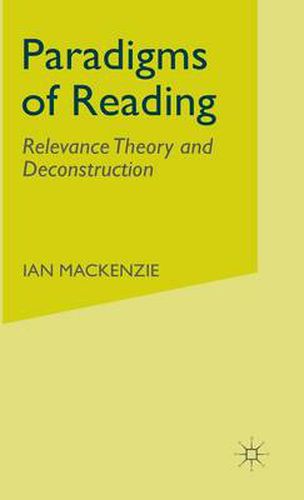Readings Newsletter
Become a Readings Member to make your shopping experience even easier.
Sign in or sign up for free!
You’re not far away from qualifying for FREE standard shipping within Australia
You’ve qualified for FREE standard shipping within Australia
The cart is loading…






This title is printed to order. This book may have been self-published. If so, we cannot guarantee the quality of the content. In the main most books will have gone through the editing process however some may not. We therefore suggest that you be aware of this before ordering this book. If in doubt check either the author or publisher’s details as we are unable to accept any returns unless they are faulty. Please contact us if you have any questions.
Linguistic signs do not coincide with intended or interpreted meanings. For relevance theory, this theoretical commonplace merely demonstrates the inferential nature of language. For Paul de Man, on the contrary, it suggested that language is unstable, random, arbitrary, mechanical, ironic and inhuman. This book seeks to shows that relevance theory is a more plausible account of communications, cognition and literary interpretation than the deconstruction theory de Man elaborated from readings of Rousseau, Hegel and Nietzsche.
$9.00 standard shipping within Australia
FREE standard shipping within Australia for orders over $100.00
Express & International shipping calculated at checkout
This title is printed to order. This book may have been self-published. If so, we cannot guarantee the quality of the content. In the main most books will have gone through the editing process however some may not. We therefore suggest that you be aware of this before ordering this book. If in doubt check either the author or publisher’s details as we are unable to accept any returns unless they are faulty. Please contact us if you have any questions.
Linguistic signs do not coincide with intended or interpreted meanings. For relevance theory, this theoretical commonplace merely demonstrates the inferential nature of language. For Paul de Man, on the contrary, it suggested that language is unstable, random, arbitrary, mechanical, ironic and inhuman. This book seeks to shows that relevance theory is a more plausible account of communications, cognition and literary interpretation than the deconstruction theory de Man elaborated from readings of Rousseau, Hegel and Nietzsche.